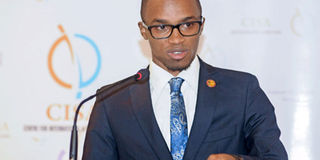Don’t sit on your idea, let it bloom

Joel Okwemba, 27, is the founder of Centre for International and Security Affairs, CISA. PHOTO| COURTESY
What you need to know:
- Joel, together with several classmates, founded a research think-tank and consulting outfit: Centre for International and Security Affairs, CISA.
- Initially, their target audience was fellow university students, but in 2015, Joel saw the need to extend the program to secondary schools.
“We realised the need to create a strong foundation for secondary students, to offer them a world view on various issues and enhance their understanding of the same issues."
Joel Okwemba’s life-changing opportunity came along when he enrolled at the Institute of Diplomacy and International Studies at the University of Nairobi.
“I studied a Bachelor’s degree in International Studies, majoring in security studies. The course moulded me to become a liberal thinker, one who is able to view issues from a global perspective,” he explains.
While in his final year at the university, Joel, together with several classmates, founded a research think-tank and consulting outfit: Centre for International and Security Affairs, CISA.
“Driven by what we had learned in class, our aim was to create a platform for young intellectuals to share their thoughts on global affairs and grow into reputable consultants, academicians, policy makers and researchers,” he says.
They were about 15 individuals when they started, but five withdrew along the way because they found it difficult to balance work and the organisation’s responsibilities.
Initially, their target audience was fellow university students, but in 2015, Joel, the founder of the organisation and overall coordinator, saw the need to extend the program to secondary schools.
“We realised the need to create a strong foundation for secondary students, to offer them a world view on various issues and enhance their understanding of the same issues. This is how Know Your World Initiative (KYWT), a program under CISA, came about.”
The initiative, he explains, involves an eight-week program that covers political, social-economic and cultural challenges faced by various countries across the world and the solutions adopted by these countries.
“Our pilot program was at Starehe Boys Centre, after which we expanded to other schools. The club is present in nine schools: Nembu girls, St Andrews Turi (Nakuru), Starehe Boys, Moi Girls, Pangani Girls, Parklands Arya Girls, Our Lady of Fatima and Upper Hill secondary school.”
So far, they have managed to reach more than 1,500 students, some of whom volunteer with CISA.

Mr Charles David Jourdan, 1st Secretary, Royal Norwegian Embassy, interacts with students at Pangani Girls’ High School . PHOTO| GILBERT MAINA
Until 2016, Joel and his 10 partners ran the affairs of the organisation part-time. It, however, proved difficult for him as the coordinator to effectively run the affairs of the group alongside his job, and so he decided to resign from his job to concentrate on the affairs of the initiative.
“Walking away from my job was a big risk, mainly because no money was coming into the organisation. What convinced me that I had made a good decision is the positive feedback I got from the teachers and students in the institutions that we visited.”
To earn a living, Joel would offer services such as research. After a while, three of his partners resigned from their jobs too to fully concentrate on the organisation.
“Besides running the KYWI and conducting research on varied matters, we organise events such as The Nairobi International Political Forum, which takes place twice a year,” Joel says.
The convention took place for the first time last year, the aim to influence thought-leadership in Africa’s international relations and foreign policy by bringing together the diplomatic community, government, corporates, think tanks and academia around contemporary global events and politics. The event took place in April.
They would not have been able to achieve what they have without the help of well-wishers. To get this help, they write proposals, which they then present to various organisations. Rallying funds, Joel points out, demands persistence and perseverance.
So far, they have partnered with 10 embassies. The 10 are the embassy of Brazil, Botswana, Angola, South Sudan, Ireland, Norway, Canada, Oman, Israel and Japan.

Ms Teresa Sweeney from the Embassy of Ireland, gives a talk at Pangani Girls’ High School. PHOTO| GILBERT MAINA
The lessons in the participating institutions are spread through a eight-week program. The resident diplomatic community of the participating countries and volunteers drawn from various universities take the students through the lessons.
“We have about 40 volunteers drawn from a number of universities and colleges in Kenya. While we are keen on students studying courses such as political science, international studies and law, we take in other specialties on a need-basis to help out with other activities such as research and administrative tasks,” he further explains.
The students choose the country they are interested in from the participating ones and the various embassies ensure participation of resident diplomatic community as guest teachers, resource people and advisers on various issues.
Recruitment of volunteers is made through their social media platforms, KYWI, at the beginning of the year.
“Running such an initiative involves a lot of resources because we need learning materials, logistics to get to particular institutions and be able to pay expenses such as office rent. To enable us to meet such expenses and offer well-researched content, we, last year, introduced an annual fee to participating embassies and private schools. We are keen on expanding to various regions across the country and involving as many schools as possible,” says Joel, adding that they aspire to continue creating systems that allow young people to interact among themselves and with the world as well.
Obviously, life-changing enterprises start with an idea.





